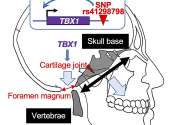Researchers identify genetic variant that helped shape human skull base evolution
Humans, Homo sapiens, have unique features compared with other closely related hominin species and primates, including the shape of the base of the skull. The evolutionary changes underlying these features were significant ...









